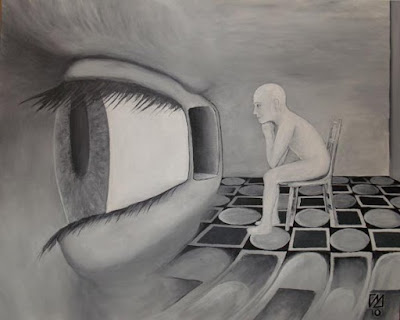"Traumatized people feel chronically unsafe in their bodies: The past is alive in the form of gnawing interior discomfort. Their bodies are constantly bombarded by visceral warning signs, and, in an attempt to control these processes, they often become expert at ignoring their gut feelings and in numbing awareness of what is played out inside. They learn to hide from their selves" (p. 98-99).
"Research confirms what our patients tell us: that the self can be detached from the body and live a phantom existence on its own" (p. 102).
- Bessel van der Kolk, The Body Keeps the Score
Last week I wrote about hyperarousal causing oversensitivity, but another symptom of CPTSD is quite the opposite: dissociation. It's common to yo-yo between the two states as shown below.
Dissociation is the symptom that I understand the least. One is in a dissociative state when they are disconnected from their environment, memory, time, senses, and/or emotions. When dissociation distorts identity, this is called depersonalization.
All symptoms fall on a continuum, and on the extreme end of depersonalization, sufferers feel that they are outside of their bodies and looking down on themselves from up above. (I have never had this experience and frankly it seems like a superpower. I don't understand how it would even be possible for someone like me... I'm terrible at spatial reasoning, so I would probably do it wrong and end up looking at a Picasso'd version of myself.)
For me, it's more accurate to say I felt trapped inside my body rather than floating outside it. It felt like my body was a robot that was programmed to live my life for me. This robot would go through the motions for me, while I was lost somewhere else or perhaps dead.
I remember looking in the mirror and seeing what appeared to be a person, marveling at what a convincing optical illusion it was. I picked up my own arm to feel its impossible weight -- just like the arm of a real person! I pored over it, amazed by the lifelike details of each freckle and vein. Whoever made this body was extremely dedicated to their delusion! I knew there was no person there. I knew I didn't exist. So I couldn't fathom how this reflection in the mirror could breathe on its own, because empty bodies can't do that. It was some crazy magic. People would talk to me and I would be surprised they could see me because I knew I wasn't really there. It would take about seven years after this symptom began before I would be certain of my own existence.
Another way depersonalization affected me was that I was detached from my own sensations and emotions. It was difficult for me to identify hunger, thirst, fatigue, or being too hot or cold, and it could take a full twenty-four hours to realize I was angry about something.
I've made a lot of progress over the years, but I sometimes forget that life is a story I'm in, not a movie I'm watching. I'll accidentally ignore people or neglect tasks, not because I forgot about them, but because I forgot me. And I still feel somewhat out of touch with my body and my own feelings. First I must become aware that I'm experiencing a feeling. Then I must identify what it is; for example, discomfort. Then I must discover the source of the discomfort: overheating. Even then, it may not occur to me that I have the ability to remedy the situation, such as using my arms (yes, they are really my arms) to remove my jacket. This whole process should be able to happen absent-mindedly, but for me it often requires intentional effort.


No comments:
Post a Comment